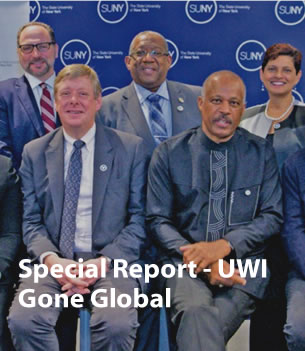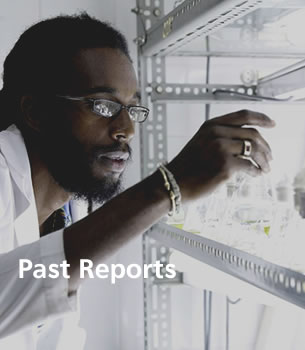Agility
Using The UWI’s resources—including human and physical—and capabilities to respond to the needs of its customers, including alumni, in a changing environment. This agility will create an entrepreneurial university with a diversified revenue base, an improved global presence to ensure economic stability through global expansion, operational efficiencies and financial profitability.
Share this page
The UWI continues to reinvent itself for the 21st century by expanding its global footprint in new and unprecedented ways. In review year, the University signed an agreement to establish the UWI-Johannesburg Institute for Global African Affairs. In that same year, another agreement was signed with the University of Lagos (UNILAG) in Nigeria for the establishment of the UNILAG-UWI Institute of African and Diaspora Studies.
Given our centuries of historical, cultural and economic ties, the Caribbean has a critical role to play, and would also benefit from, the phenomenal global rise of Africa in the next ten to twenty years.
These entities come on the heels of the creation of the SUNY-UWI Center for Leadership and Sustainable Development in New York, USA, and the UWI-China Institute of Information Technology (UWICIIT) in Suzhou, China.
There are other such initiatives in various stages of planning, which are expected to birth other collaborative centres overseas in the next academic year. Among these are discussions with Brock University in Ontario, Canada, Coventry University in the UK , and Universidad de los Andres in Colombia.

Ceremony at The UWI Cave Hill Campus to commemorate the launch of The UWI-Johannesburg Institute for Global African Affairs.

Launch of the UNILAG - UWI Institute of African and Diaspora Studies at the University of Lagos in Nigeria.
Digital Transformation High on the Agenda
The UWI has placed premium importance on its digital transformation to enable it to take a 21st century approach to all its operations, to better serve the needs of its student population—most of whom are millennials—and to meet the challenges of the era on a solid technological footing.
In the period under review, several initiatives were led by the ONE UWI ICT Steering Committee, chaired by Pro Vice-Chancellor and Principal of the St. Augustine Campus, Professor Brian Copeland. Among them, the ONE UWI Digital Transformation workshop in May 2018; which was followed by the completion and delivery of the ONE UWI Digital Transformation Report in July 2018.
Another far-reaching ONE UWI initiative in the reporting year was the introduction of the Moodle application, which will further facilitate offline teaching and learning. Co-ordinated efforts are also being made to transition all campuses to the Office 365 platform.
Digital transformation of The UWI will enable and foster seamless academic, administrative and financial data exchange across campuses, thus creating greater operational efficiencies.
Economies of Scale and Scope a Must for Economic Survival
The current financial environment makes it imperative for Economies of Scale and Scope a Must for Economic Survival. The current financial environment makes it imperative The UWI to manage its expenditure in many ways, including taking advantage of the economies of scale and scope. The digital transformation of The UWI is a prime example of the application of this precept, as it will increase access, service and development in each contributing country and subscribing community of The UWI, rather than just the urban centres of the three campus countries.
Alternative Funding Models
In December 2017, a special task force was set up to consider a new model for future funding of Caribbean higher education. This, in response to the significant level of government receivables across The UWI's contributing countries and the inability of governments to sustain the 80/20 (government/student) cost-sharing model. The task force's mandate included: the examination of creative ways to access the public debt owed to The UWI; the exploration of ways within the private and public sectors to expand the cash and capital means; and the development of The UWI's financial capacity. The task force, co-chaired by Professor Densil Williams, Pro Vice-Chancellor, Planning and Mr. Ravi Rambarran, Group Chief Operating Officer, Sagicor Financial Corporation, comprised representatives of the private sector, contributing governments, the student body and university executive management.

The UWI Delegation making representation at the CARICOM Heads of Government Meeting.


The Government of Trinidad and Tobago enters into a partnership with The UWI to operate the Couva hospital, in settlement of its outstanding debt.

The arrears in question were discussed at the CARICOM Heads of Government meeting in Haiti in early 2018, where Vice-Chancellor Beckles made a special presentation to Caribbean leaders. In response, heads of government not only expressed concern over the impact of the financial situation on all aspects of The UWI's operations. Many pledged a range of physical assets and other revenue-generating assets in lieu of cash. Among them are the government of Trinidad and Tobago's contribution of the Couva Hospital; the government of Grenada's contribution of 90 acres of land, and the government of Jamaica's commitment to the building of Technology Parks. The establishment of a University Trust Fund is also under consideration to help manage the institution's wealth potential.
Funding the Enterprise
In lean economic times, the University continued to seek out other avenues of funding. Several initiatives in the review year undertaken by the University Office of Development helped secure seed funding for major projects such as the development of the Faculty of Sport, and UWItv, among others.
Innovation and Entrepreneurship

Professor John Agard
Director, St. Augustine Centre for Innovation and Entrepreneurship (StACIE)
The commercialisation of research is being energetically pursued as part of the University's strategy to establish a profitable Innovation and Entrepreneurship (I&E) ecosystem. In the quest for this objective, the St. Augustine Centre for Innovation and Entrepreneurship (StACIE) (renamed from the Office for Research, Development and Knowledge Transfer), led by Professor John Agard, has made significant progress. Newly appointed Professor of Practice Gerry Brooks, with support from Mr. Julian Henry of the Entrepreneurship Unit of the Faculty of Social Sciences, will detail plans for the ecosystem's formation. The University also agreed to establish UWI Ventures, a company based at St. Augustine with strong private sector participation, that will do the final vetting for capitalisation of projects and will be a holding company for UWI start-ups. A source of great pride is the recent grant of a patent for a new and improved fingerprinting technology in the USA and in Trinidad and Tobago.







